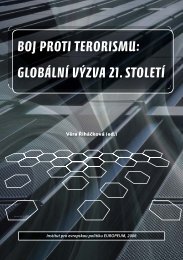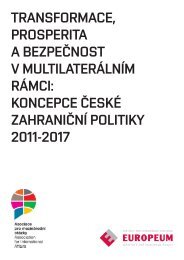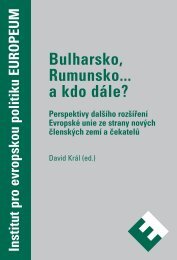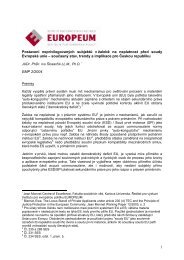eu constitutionalisation - EUROPEUM Institute for European Policy
eu constitutionalisation - EUROPEUM Institute for European Policy
eu constitutionalisation - EUROPEUM Institute for European Policy
Create successful ePaper yourself
Turn your PDF publications into a flip-book with our unique Google optimized e-Paper software.
Chapter 7: Flexible Integration in the Common Foreign and Security <strong>Policy</strong>interest of the EU as a whole by asserting its identity as a coherent <strong>for</strong>ceon the international scene. Furthermore it has to respect the principles,objectives, general guidelines and consistency to the CFSP, as well as thedecisions taken within this policy, the powers of the <strong>European</strong> Communityand consistency between all the Union’s policies and external activities. Inturn, the application of the general rules contained in Articles 43-45 TEUare confined by the prevailing acquis communautaire and the principles ofunity and consistency.Chapter 7: Flexible Integration in the Common Foreign and Security <strong>Policy</strong>bears reference to commercial, social and further EC-related policies,including issues such as competition, merger-control or subsidies inthe industrial sector.²⁰ Against this background one may argued, thatenhanced cooperation in the field of armaments cooperation does notinfringe Article 27b TEU.C. Enhanced cooperation in the draft constitutional treatyB. Enhanced cooperation in the CFSP (Article 27 a–e TEU)At the beginning of the IGC 2000 leading to the treaty of Nice, extendingenhanced cooperation to the realm of the second pillar was a non-issue.¹⁷It took the member states until the <strong>European</strong> Council summit in Feira inJune 2000 to officially add it to the common agenda.¹⁸ However, the provisionsintroducing enhanced cooperation into CFSP constitute not morethan a thin compromise. A number of constraints, which have been addedat the request of the UK, Ireland and Sweden, added to its complexity andreduced the potential to effectively exploit the opportunities offered by themechanism of enhanced cooperation.¹⁹Firstly, the veto “<strong>for</strong> important and stated reasons of national policy” whichhad been lifted in the first and in the third pillar has been inserted intosecond pillar matters (Article 27c; Article 23 para 2 (2) TEU); secondly,enhanced cooperation in the CFSP will only relate to the implementationof a joint action or a common position (Article 27b TEU) andthirdly, all matters having military or defence implications are excludedfrom its application (Article 27b TEU). The later limitation does not, inthe light of Article 17 para 1 (3) TEU, extend to (enhanced) cooperationbetween member states in the field of armaments. Based on a strict terminologicalinterpretation, procurement and coordination in the fieldof armaments are obviously related to defence. However, armament17) The so-called Amsterdam left-overs are summarised in the “Protocol on the institutions with the prospectof enlargement of the <strong>European</strong> Union” appended to the treaty of Amsterdam. They refer to the sizeand composition of the Commission, the weighting of votes in the Council, the possible extension ofqualified majority voting in the Council as well as other necessary amendments to the treaties arising asregards the <strong>European</strong> institutions in connection with the above issues and in implementing the treatyof Amsterdam.18) See FISCHER (2003) pp. 53 seq.19) See STUBB (2002) pp.130 seq.246(Article I-44 TCE; Articles III-416 to III-423 TCE)Even though to date enhanced cooperation has never been practicallyapplied yet, it has been further developed within the framework of the<strong>European</strong> Convention leading to an extension of its scope as laid downin the draft constitutional treaty. The legal bases governing enhancedcooperation do not follow any systematic design but are deliberatelyspread among the first and the third part of the draft constitutional treaty.Moreover they are subdivided in general and specific norms, whereby theprinciple of lex specialis derogat legi generali has to be applied. However incases of legal conflict or lack of normative clarity one has to take recourseto the general norms of enhanced cooperation or even to those governingCFSP as such.Similarly to the current treaty version, the instrument of enhanced cooperation,which is unconditionally open to all member states, “shall aim tofurther the objectives of the Union, to protect its interests and rein<strong>for</strong>ce its integrationprocess” (Article I-44 TCE). Its establishment shall only be authorised by theCouncil “as a last resort” after proving that the pursued objectives cannot berealised “within a reasonable period” by the Union as a whole. In addition theUnion Minister <strong>for</strong> Foreign Affairs and the Commission are entitled to issueopinions on the proposed enhanced cooperation’s consistency with CFSPand other Union policies. The <strong>European</strong> Parliament is to be in<strong>for</strong>med. Inorder to initiate the procedure of enhanced cooperation at least one thirdof the member states must agree to work together.Compared to the current treaty regime the proposed procedure is less cumbersomeand restrictive. Above all, enhanced cooperation might be estab-20) See TRYBUS (2004) pp.189-217 (193).247








